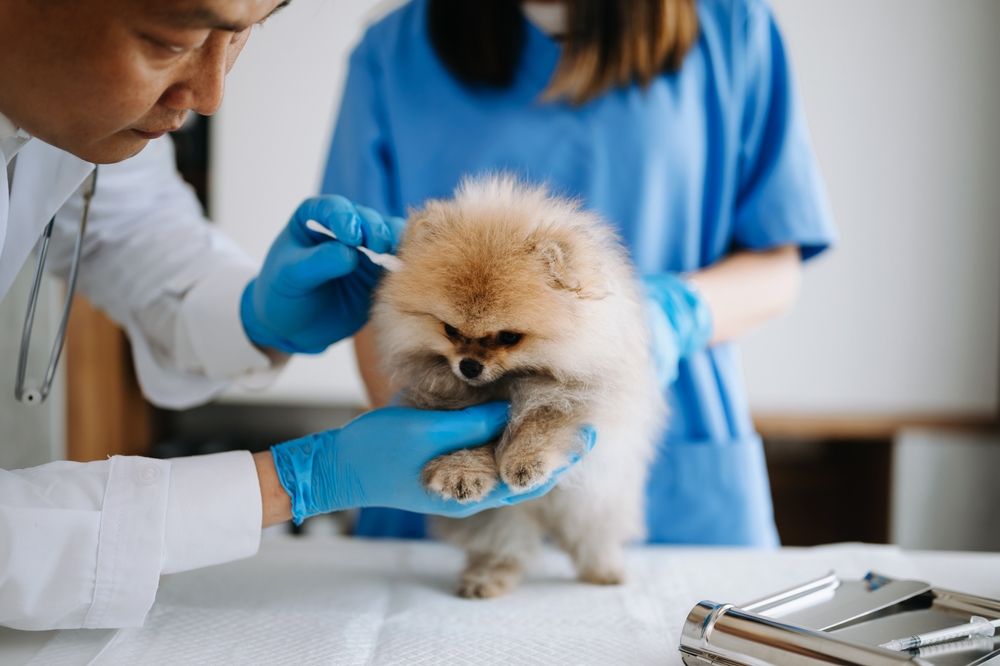
Why Is My Pet Itchy?
You want the best for your pet, and if they are itchy, your furry pal is miserable. Constant licking, scratching, biting, and collar jangling are annoying for them and the whole family. Skin problems are some of the most common issues pets face. When you understand the causes of pets’ skin issues, you can help keep your pet’s skin healthy and prevent irritation, itchiness, and infection. Our Harbor Pines Veterinary Hospital team cares for your pet’s comfort and well-being, and this guide will help you understand pet itchiness and help them get relief.
Common pet itchiness causes
Many issues cause pets’ itchiness and skin discomfort. Consider these common skin problems in pets:
- Flea allergy dermatitis (FAD) — Many pets are bothered by fleas, and a single flea bite can send a dog with FAD into a spiral of itching, skin inflammation, broken skin, and even secondary infections. Fleas inject saliva into a pet’s bloodstream when they bite, and some pets are allergic to the saliva’s proteins. Pets with FAD are intensely itchy near their tail base, armpits, and groin, and may develop redness, irritation, and broken skin from constant scratching. Pets may need antibiotic treatment if secondary infections occur.
- Food allergies — Pets can be allergic to an ingredient in their food, most commonly a protein. Beef, dairy, chicken, and wheat have all been reported to cause allergic reactions in pets that often manifest as itchiness. A pet’s food allergy usually starts when they are younger than 6 to 8 months of age or when they are older than 6 years, and the itchiness is nonseasonal. Food allergy signs include inflammation, flaky skin, and a dull, greasy coat. These pets are typically itchy on their face, around their anus, in their armpits, and their feet.
- Environmental allergies — Pets can develop allergies, or atopy, to environmental allergens such as pollen, dust, mites, grasses, blooming bushes or trees, or mold. These allergies may be seasonal or year-round. Environmental allergy signs may also worsen each year and may include itchiness, redness, flaky skin, and recurrent ear infections.
- Skin infections — Skin infections can be intensely itchy and may be caused by bacteria, yeast, or a combination of the two. Common areas where infection can take hold include any dark, moist skin area between the toes, inside the ear flaps, and even in the skin folds of breeds such as pugs, bulldogs, or shar-peis. When bacteria and yeast are present, and pets bite, scratch, or rub these areas, inflammation, foul odor, and infection can occur.
Pet itchiness treatments
Treating pets with itchiness is complicated because, many times, they are itchy for several reasons. Diagnosing and treating itchiness can be a long process, and our Harbor Pines Veterinary Center veterinarian will carefully tailor your pet’s treatment plan to their signs. Many times, several therapies are prescribed simultaneously:
- Diet change — Pets with food allergies can sometimes benefit from a novel protein or hydrolyzed protein diet. This diet change should be part of a well-controlled, veterinarian-directed food trial, whereby the pet is prevented from eating any other food for several weeks or months to determine if signs resolve or change. This strict regimen can yield good results but takes pet owners’ patience and dedication.
- Environmental control — If a pet suffers from an environmental allergy, recommendations include frequent bathing with hypoallergenic shampoos, laundering pet bedding weekly, and mopping all your home’s floors weekly. Our team may also recommend preventing your pet from rolling in the grass or spending time outside when pollen counts are high. If your pet has been outdoors, wipe their feet with a damp cloth and thoroughly dry their paws before coming back into the house. Doing so can help prevent allergens from being tracked into the house. In addition, your pet may benefit if you run a high-efficiency particulate air (HEPA) filter in your home.
- Flea control — One of the most effective treatment recommendations is maintaining consistent flea control. This includes administering monthly flea preventives to your pet, washing their bedding regularly, vacuuming your home frequently, and treating any areas that may be infested. Consistent flea control is vital for dogs with FAD, as a single flea bite can cause an allergic reaction.
- Immunotherapy — If your pet suffers from allergies, our team may administer immunotherapy—allergy shots—to your pet. This treatment method involves gradually introducing small allergen doses into the body, which helps to train the immune system to become less sensitive to the allergen over time. As the dosage increases, your pet’s immune system becomes increasingly desensitized to the allergen, which can lead to long-term allergy sign relief.
- Medications — If your pet experiences itchiness, our team may prescribe medication to relieve your pet’s signs. While antihistamines are not typically effective on their own, they may be combined with other drugs for a comprehensive treatment approach. Corticosteroids can also alleviate itching in the short term while a longer-term treatment plan is developed. Other anti-itch medications are also available, and our team will help determine what product is best for your itchy pet.
- Topical medications — Skin inflammation in pets can be treated with various topical medications that are applied directly to the affected area. These medications come in different forms, such as creams, oils, shampoos, rinses, and sprays, and they contain various compounds such as topical anesthetics, hypoallergenic shampoos, soothing oatmeal, moisturizers, antibacterial and antifungal compounds, and topical corticosteroids. Our veterinary team will advise you on the best topical medication based on your pet’s specific needs and their skin condition’s severity.
Pets can become itchy for various reasons such as allergies, parasites, infections, and skin conditions. Ignoring the itchiness can cause your furry friend to develop significant health issues, so treatment is imperative. Our Harbor Pines Veterinary Center team is always here to help you. Call us today to schedule an appointment for your furry companion and give them the relief they deserve.

